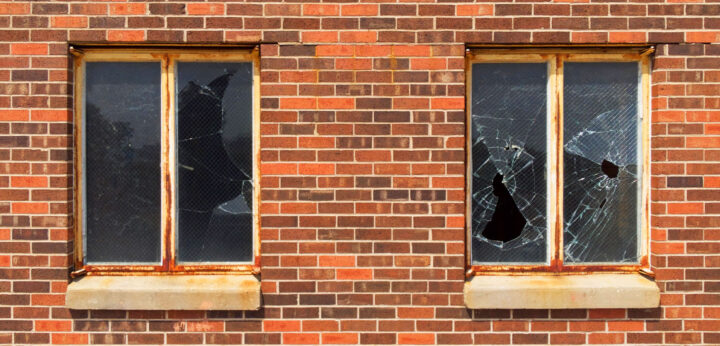Table of Contents
When does renters insurance cover broken windows?
In general, renters insurance doesn’t cover broken windows. Although renters insurance provides personal property coverage, it doesn’t cover any part of the building you live in, including the walls, flooring, and windows. That’s because as a tenant, your house or apartment isn’t your property — it’s your landlord’s.
However, there are two situations in which renters insurance sometimes covers expenses related to broken windows:
- When you break someone else’s window and they sue you for it
- When you have a broken window in your home that renders the unit uninhabitable
Let’s look at those scenarios in more detail.
1. You break someone’s window and they sue you
Renters insurance provides personal liability coverage, which covers your legal expenses if you damage someone’s property and they take you to court.
This means that if you (or your child) breaks someone else’s window, e.g. by throwing a baseball through it, your insurer will cover your attorney fees if they sue you. They’ll also cover any damages the victim is awarded.
Your renters insurance will also cover your legal expenses if you negligently break your own window and your landlord sues you. However, situations like that are rare, because most landlords will just take the money out of your security deposit.
2. A broken window renders your unit uninhabitable
Renters insurance also provides something called loss-of-use coverage. This is a type of coverage that kicks in and pays for your expenses (e.g. your hotel stay) if a disaster damages your home so badly that you have to move out for a while.
Depending on your situation, a broken window might be severe enough to qualify for loss-of-use coverage if you can make the case it makes your home unsafe instead of just being an inconvenience. For instance, if the broken window means that burglars can easily get in, or if it could expose you to extreme weather, you might be able to get your insurer to pay for a hotel until it’s fixed.
The catch is that your loss-of-use coverage will only kick in if your window was broken by a covered peril, i.e. a type of damage listed in your policy. Theft and vandalism are covered perils, so a burglar breaks your window, you can file a loss-of-use claim.
On the other hand, damage that you cause through your own negligence isn’t covered by most policies, so if you accidentally broke your own window, you’ll have to pay for your hotel stay yourself.
When are landlords responsible for paying for broken windows?
Your landlord is responsible for paying for your broken window as long as the damage wasn’t your fault.
For instance, if your window was broken by a falling tree branch, a windstorm, or by your neighbor’s kid throwing a rock through it, your landlord is obligated to pay for the damage (although not necessarily out of their own pocket — in those scenarios, their own insurance policy would probably cover it).
Your landlord is also obligated to pay for everyday wear-and-tear, as well as for any damage they cause themselves, either directly or indirectly. If your landlord fails to properly maintain the property and that somehow leads to a window breaking, they’re responsible.
When are tenants responsible for paying for broken windows?
If you broke your window, you’re responsible for the damage. As mentioned, your landlord will probably just take the money out of your security deposit. They might ask you for more if your deposit isn’t enough to fully cover the repairs, although if that happens, you should ask to see receipts from the repair company or vendor before paying.
How to file a renters insurance claim for a broken window
You can’t file a renters insurance claim for a broken window under your policy’s personal property coverage. However, you can file a claim under your loss-of-use coverage or personal liability coverage.
Filing a loss-of-use claim for a broken window
If you need to file a loss-of-use claim because one of your windows was broken, follow these steps:
1. Notify your landlord and the police about the damage
You should immediately contact your landlord and let them know that one of your windows was broken so that they can hire someone to replace it. If it wasn’t your fault, clearly explain how it happened so they don’t try to hold you accountable.
If there was criminal activity involved, e.g. if the window was broken by a burglar or a vandal, you should file a police report as well. Get a copy of the police report so that you can submit it to your insurer later.
2. Document the damage
Take pictures of the broken window from both sides. Save these pictures in a safe place; your insurer will want to see the extent of the damage when you file your claim to verify that your home really is unlivable.
3. Contact your insurance company
Visit your insurer’s website and follow the instructions on it to file your claim. These days, most companies allow you to file claims online, although if your insurer is old-fashioned, they might want you to call them instead.
Do this as soon as you can; many insurers have a time limit of 48 to 72 hours on how long you can wait after an incident before filing a claim. Be prepared to provide your policy number and any documentation you have, including the photos you took and the police report, if you filed one.
4. List your typical living expenses
Following your insurer’s instructions, fill out a list of your typical living expenses, including how much you spend on rent and how much your groceries usually cost per week. Later, you’ll submit receipts showing your expenses while you were unable to stay in your home, and your insurer will pay you the difference.
5. Find alternate accommodations
At this point, it’s time to find a hotel to stay in while your window is being repaired. Look for one that’s within your normal budget. Your renters insurance loss-of-use coverage is meant to let you maintain your typical standard of living, and your insurer might not cover all of your expenses if you opt to stay in the nicest hotel in town (unless that’s how you normally live).
6. Track your additional living expenses
Save all of your receipts, especially for your hotel bill and groceries. Your insurer will ask you to regularly submit these (probably on a weekly basis) so that they can reimburse you for the extra expenses you incur while your window is being repaired.
Filing a personal liability claim for a broken window
If you’re considering filing a liability claim, it probably means that someone is threatening to take you to court over their broken window. Filing this type of claim is less straightforward than filing a loss-of-use claim because there are other people involved.
Before you do anything else, contact your insurer following the process on their website and explain the situation to them. They’ll walk you through the next steps and put you in touch with an attorney who can provide more guidance.
Related Questions
- What is guest medical coverage in renters insurance?
- What is a sub-limit in renters insurance?
- Does renters insurance cover home-based businesses?
- Does renters insurance cover gold or silver bullion?
- What does "dependent in the care of" mean in renters insurance?
- Does State Farm renters insurance cover hotel stays?






